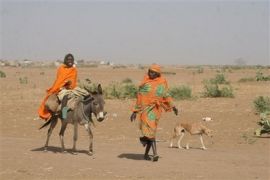New U.N. force seeks to protect Darfur women from rape
February 18, 2008 (KALMA) — U.N. peacekeepers in armored vehicles and pickup trucks whizzed through this Darfur refugee camp, and a dozen women came to meet them, bringing their donkeys, water rations and homemade axes. It’s time for one of the refugees’ most perilous tasks: collecting firewood.

Countless refugee women have been assaulted or raped, mostly by Arab janjaweed militiamen, when they leave the relative safety of their camps to gather wood out in the open wilderness of Sudan’s wartorn Darfur region. Most men don’t even leave the camps because they risk being killed.
But one of the first steps taken by U.N. peacekeepers since they launched their mission in Darfur in January is to restore “firewood patrols” to protect women on their forays outside Kalma, home to 90,000 refugees and one of the region’s largest camps.
The women walking out of Kalma one morning in late January were smiling and waving hellos as their leader, Khadidja Abdallah, came up to greet the peacekeepers who had come to escort them.
It is a stark contrast to nearly a year ago, in May, when an Associated Press reporter first met Khadidja. Then, the “sheikha,” or woman chief, was cowering in a mud hut deep inside Kalma, trying to comfort seven refugee women from her section of the camp who’d been gang-raped while collecting firewood.
African Union peacekeepers in place at the time had halted firewood patrols because they felt powerless to stop violence and faced strong refugee resentment as a result. Khadidja and the woman bitterly complained that the AU force had all but given up on protecting Darfur civilians.
The 7,000-member AU force, in place since 2004, was woefully underequipped and understaffed and failed to pacify Darfur, where over 200,000 people have died since fighting broke out in 2003.
In its initial stages, the joint U.N.-African mission, known as UNAMID, that has taken its place faces some of the same problems. It is currently almost entirely composed of the same AU troops, plus an additional 2,000 peacekeepers, and could take much of 2008 to reach its planned strength of 26,000. It still lacks the same heavy equipment and air power the AU force needed, top U.N. officials say.
But UNAMID has restored the firewood patrols at Kalma in an attempt to quickly show they can improve security in Darfur.
“Now, it’s every Monday and Thursday,” a grinning Khadidja said of the patrols.
The column of U.N. police cars, pickups and three APCs escorted the women some 10 kilometers (6 miles) into the surrounding wasteland to a place known as “the forest,” a comparatively less arid stretch of rocky hills where thorny shrubs grow among a few scarce baobab trees – the same area where the seven women were raped last year.
As the peacekeepers found shade in the rocks, small groups of women around the valley chopped branches and raked the ground for stray grass to use as animal fodder. A dozen or so men felt safe enough to come along and share some of the work under Darfur’s unforgiving white sun.
Cattle belonging to Arab nomads appeared from time to time in the distance, but no gunmen were seen.
“I think the fighters here know they can’t challenge us anymore,” said a U.N. officer on the patrol, speaking on condition of anonymity in accordance to army regulations. “They know that since the new mandate, we can shoot to protect civilians.”
Peacekeepers hope to spread the firewood patrols to the dozens of camps around Darfur, but have begun with Kalma because incidents of rape and violence there have been among the highest. Located only a few miles from UNAMID’s headquarters, it also allows for patrols with the UNAMID’s current, restricted means.
More than 2.5 million people have fled to camps around Darfur in the war between the Arab-dominated Khartoum government and ethnic African rebels. The government is accused of unleashing the janjaweed, who are blamed for widespread atrocities against ethnic African villagers and refugees.
Even during the firewood patrol, the dangers were still clear. As the peacekeepers began heading back to Kalma in the afternoon, a convoy of government paramilitaries known as the Central Reserve Police Force, rushed by – the force is believed to be largely made up of janjaweed put into uniforms.
The heavily armed men glared at the peacekeepers as their pickups sped within inches of the U.N. vehicles.
“Slow down, we really don’t want to collide with them!” an officer yelled in the U.N. patrol cars’ radios.
(AP)
